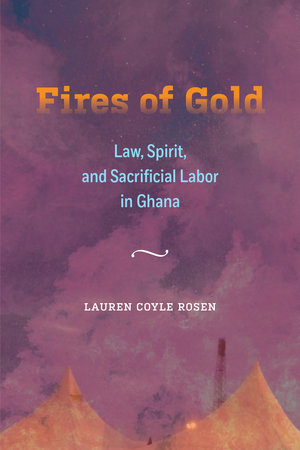by J. Brent Crosson
Lauren Coyle Rosen, Fires of Gold: law, spirit, and sacrificial labor in Ghana (Oakland, CA: University of California Press, 2020; 224 pages; $29.95.
Like anthropologists, fifteenth and sixteenth century European merchants liked to spin tales of first encounter and puzzling cultural difference. One of the biggest conundrums noted in these accounts surrounded the value of gold in West Africa. The highly developed bureaucratic societies of West Africa obviously prized gold to a high degree. Yet, European traders found that they were able to trade “trifles” for gold in their early exchanges with West Africans (see Pietz 1987: 41). Echoing innumerable accounts in which Western Europeans thought they got something of value for next to nothing from non-Europeans (Manhattan for some disease-infested blankets, to take one hackneyed trope), these traders marveled at the seeming “irrationality” of these exchanges. West Africans, they concluded, did not know how to properly value material objects. Such an idea laid the foundation for European theories of fetishism—the imputed worship of random material objects—that dominated Europeans’ accounts of sub-Saharan African political, economic, and religious practices from the eighteenth century onwards. Yet, drawing on critiques of Western capitalism that turned fetishism on its head, one might say it was not West Africans who misunderstood the value of gold in these interactions but Western Europeans who misunderstood the value of exchange.
Lauren Coyle Rosen’s compelling ethnography of a Ghanaian gold-mining city centers on the value of gold. But, as in those early modern mercantile encounters, it is also about the very logics of religion and ritual that place conflicting understandings of the value of exchange at the center of political struggles. Fires of Gold masterfully theorizes the dynamics of “liberalization,” which have occurred not just in Ghana but across the world since the late 1980s, as altered early modern ideas about the free market have reformed postcolonial welfare states. Such liberalization is not simply a process of economic reform, Rosen reminds us, but a phenomenon in which the spiritual and the political are entangled. In reviewing the book, I would like to foreground the implications for the religious value of exchange that emerge from this excellent work.

The city in Ghana that animates Fires of Gold is a place built around gold mining. Depending on the perspective of the actors involved, it is either a “company town” with an artisanal mining problem or a wildcat town with a company problem. Since the late 1980s, “liberalization” has meant the privatization of industries, resources, and services formerly the province of the postcolonial state.
This neoliberal process, driven by transnational lending institutions and foreign capital, should be a familiar story. What this book helped me think through were the ethical and religious transformations of exchange this process of liberalization has implied. I have begun to believe that Western liberalism—in both its economic and religious forms—is defined by the attempt to de-ethicize material exchange (at least discursively), in turn ethicizing the self as a private realm of affect that can transcend exchange. That is why the propriety of the sacred realms of Western liberalism—whether religion or romantic love—are defined by their transcendence of interested exchange. Bad love or bad religion, in contrast, are conditioned by material exchange, becoming unethical matters of interest that bleed into Western liberalism’s other sacred realm—the market. But again, in a strange way, the market is ethicized by exempting it from obligational exchange. This idealized (and non-existent) market is a place of free and equal actors defined by individual choice rather than obligation. In (neo)liberal formulations, an opposition between freedom and obligation means that obligational exchange becomes the domain of oppressive or archaic structures—the contracts defined by kinship, tradition, or social welfare rather than individual desire. The individual par excellence is either the property-owning individual or the corporation.
In the “company town” of Fires of Gold this liberalization means the nullification of the obligational bond between nationalized mining company and the city (a bond based on dreams of social welfare centered on the postcolonial state). As liberalization increasingly privatizes the postcolonial state, the ethical claims of obligational exchange are increasingly taken up by actors defined in liberal terms as “informal.” Rosen defines these “informal” powers as “shadow sovereigns,” with the caveat that these shadows are no less substantial than the liberalist figures of economy, politics, and religion that cast them. If the neoliberal state’s primary function is securing the “rule of law” and property rights rather than redistributing wealth, then it casts state-like shadows that demand a different kind of sovereignty centered on hierarchical relations of responsibility. If liberal ideals of religion cast it as a spiritual matter of conscience separate from economy and politics, then religion’s shadows foreground the ethics of material exchange with spiritual entities. These “shadows,” it seems to me, necessitate a different conception of sovereignty from that often forwarded by Western political theory. Rather than juridical force, sovereignty is defined by proper reciprocity within hierarchical relations of exchange. Such a conception is rooted less in a contractual exchange between juridically equal parties and more in something like the noblesse oblige of hierarchical clientelism. Is the now-privatized and transnational gold mining company of Fires of Gold responsible for a sacrificial exchange to the city it helped to make, or is it a juridical entity responsible only to its shareholders and profit margins? This is one of the questions that the interlocutors in the West African mining city of Fires of Gold debate.
The ethical/religious problem for the latter conception of sovereignty as securing property and individual rights is that the generation of mining wealth, as Rosen’s interlocutors show in a variety of ways, is still bound to reciprocal exchange with spiritual entities. In the conceptions of Africana religions, these entities are chthonic sovereigns that must be ritually paid for their gold. In neo-Pentecostal terms, as Rosen shows, these entities are demonic forces that had been paid in traditional rites, thus embedding their allegedly malignant presence in the landscape. Both “traditional ritual authorities” (as Rosen terms them) and neo-Pentecostal leaders recognize the power of these subsoil spiritual forces, but they often argue for opposing remedies for the town’s increasing poverty and lack of employment (related to the company’s programs of liberalization). For “traditional ritual authorities” the remedy would be ethicizing the terms of exchange with chthonic entities, which can grow angry if not properly reciprocated. For neo-Pentecostal leaders, the remedy seems to be the excision of exchange from proper religion, nullifying contracts with chthonic entities through a born-again Christianity. The latter enacts a liberal vision of religion as non-sacrificial (using rather non-liberal means of spiritual warfare), while the former insists that ritual is material exchange. In the latter, the self becomes the sacrifice that nullifies obligational exchange as a basis for ethics (with Jesus the prototypical form of this sacrifice). In the former, ritual exchange requires constant practice to make an ethical world and, like the market, it does not have an end point in which an ultimate exchange nullifies exchange-based reciprocity. The latter frees wealth from an ethics of material obligation, making material exchange about the value of objects rather than relations between persons. The former sees exchange as a means to maintain delicate hierarchical bonds and avert violence (albeit through exchanges that are not free of violence). If the neo-Pentecostal dream is one of neoliberal prosperity under God, free and unfettered (if not for those atavistic traditions), then the “traditional ritual authority” represents a rude awakening to obligational reciprocity (with all the violence that the breakdown of such exchange can imply).
The early modern European traders in West Africa saw the value of their exchange as determined by the objects involved—gold and trinkets—rather than the relations of obligation forged by such intercourse. Fires of Gold inspired me to think about how this value system depends on spiritual conceptions, even as liberal ideals of religion often attempt to separate moral religion from instrumental value (all the while making capitalist values the basis for ethical training). The European traders, one might guess, thought they had gotten something for nothing, while the West African traders thought they had cemented an obligational bond. In the context of Fires of Gold, contemporary artisanal miners demand a corporate sovereignty rooted in responsibility, while the transnational mining company presents itself as a private entity with property rights. Yet, Rosen shows how the situation is a good bit more complicated than such an opposition would imply. The relationship between “informal” miners and the mining company necessitates “shadow” regimes of reciprocity between the company and wildcat miners. Artisan miners pay company guards to mine on company land, and the company both criminalizes and recognizes such relations. The violence that adheres in this relationship between unemployed miners and company, as Rosen notes, illustrates “not a legal system broken down, but rather a heavily liberalized legal system that is working all too well” (6). In other words, the juridical and privatized sovereignty of neoliberal regimes depends upon extra-legal relations of violence and reciprocity.
This apparent contradiction between legal and extra-legal power constitutes the cunning of neoliberal sovereignty, and these dynamics are not limited to West Africa. Sitting in the midst of a massive utility outage in Texas during a week-long arctic blast, the effects of the liberalization of public utilities is readily apparent. By privatizing and deregulating its energy grid, Texas enacted an “energy sovereignty” that assured the state’s system was characterized by a patchwork of private sovereigns who could comply or fail to comply with regulation standards. Public discourse casts such structural violence as failure—inspiring calls for the rationalization of regulation regimes. Far from a failure, such crises represent a neoliberal system of regulation functioning as designed. It is then left for “informal” actors to make claims on the state as an entity whose sovereignty is based in reciprocity—the provision of public services. But a heavily liberalized regime of law and regulation ensures that the state can abdicate such responsibility to the private sector, which in turn can dodge social welfare responsibility because they are private companies. In between the lines, “shadow” relations of obligation keep the system going—the governor appoints private sector allies to head government agencies and private entities give money to political campaigns in return for favorable contracts or a regulatory blind eye. This is precisely how the system is designed to work, with a heavily legalized language of neoliberal sovereignty depending on the “shadow” spaces of power worked out through relations of coercive obligation. Rather than being trapped in the cunning deferrals of this cycle between “legal” and “extralegal” or “formal” and “informal,” Rosen lays bare the deferrals of this system and the violence that it creates, making her book essential reading during blackouts, wildcat strikes, or public health debacles. Just remember to have a flash light ready to read it.
Sources
Pietz, William. 1987. “The Problem of the Fetish, II: The Origin of the Fetish.” RES: Anthropology and Aesthetics 13 (Spring): 23-45.
J. Brent Crosson is an Assistant Professor of Religion at the University of Texas who focuses on secularism and religion in the Carribean.


